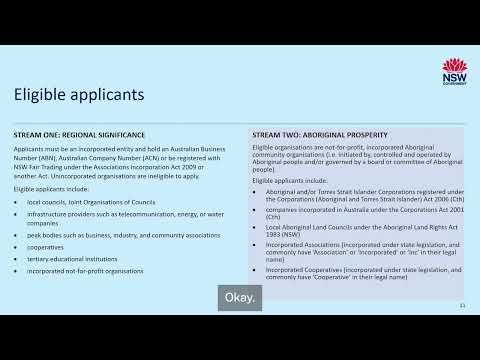The Business Case and Strategy development fund supports strategies and initiatives that will strengthen community infrastructure, regional prosperity, and planning for future projects.
Key information
- Status: Closed
- Grant amount: Amount determined by business case or strategy.
- Application opened: 29 June 2022
- Application closed: 24 August 2022
Program objective
The Regional NSW - Business Case and Strategy Development Fund aims to support local councils, joint organisations of councils, not-for-profit, industry and Aboriginal community groups develop business cases or strategies for projects delivering significant economic or social benefits to regional communities, with a focus on infrastructure.
The funding will help organisations build their capacity to plan for and deliver projects and regional development initiatives. The program will also help to build a pipeline of investment-ready projects for future funding opportunities.
The Regional NSW - Business Case and Strategy Development Fund aims to:
- encourage regional collaboration to identify projects and strategies with regional scale and impact
- increase alignment of regional projects and strategies with Regional Economic Development Strategies (REDS) and other relevant regional or NSW Government plans and policies
- build a pipeline of investment-ready economic and priority community projects in regional NSW.
The Regional NSW - Business Case and Strategy Development Fund comes under the $3.3 billion Regional Growth Fund. It’s part of the NSW Government’s ongoing commitment to supporting our regions in practical and effective ways and giving local organisations the resources to deliver exactly what their communities need.
Available Funding
- Stream One: Regional Significance – up to $27 million available funding.
- Stream Two: Aboriginal Prosperity – up to $7 million available funding.
This program is funded and administered by Department of Regional NSW.
Eligibility
Who can apply
Stream One: Regional Significance
Applicants must be an incorporated entity and hold an Australian Business Number (ABN), Australian Company Number (ACN) or be registered with NSW Fair Trading under the Associations Incorporation Act 2009 or another Act. Unincorporated organisations are ineligible to apply.
Eligible applicants include:
- local councils or Joint Organisations of Councils
- infrastructure providers such as telecommunication, energy, or water companies
- peak bodies such as business, industry, and community associations
- cooperatives
- tertiary educational institutions
- incorporated not-for-profit organisations.
Stream Two: Aboriginal Prosperity
Eligible organisations are not-for-profit, incorporated Aboriginal community organisations (i.e. initiated by, controlled and operated by Aboriginal people and/or governed by a board or committee of Aboriginal people).
Eligible applicants include:
- Aboriginal and/or Torres Strait Islander Corporations registered under the Corporations (Aboriginal and Torres Strait Islander) Act 2006
- companies incorporated in Australia under the Corporations Act 2001
- Local Aboriginal Land Councils under the Aboriginal Land Rights Act 1983 (NSW)
- Incorporated Associations (incorporated under state legislation, and commonly have ‘Association’ or ‘Incorporated’ or ‘Inc’ in their legal name)
- Incorporated Cooperatives (incorporated under state legislation, and commonly have ’Cooperative’ in their legal name).
Who can’t apply
Ineligible applicants include:
- businesses, except where specifically noted as eligible or as part of a public/private partnership
- unincorporated organisations
- trusts
- partnerships
- pre-school, primary and secondary schools
- individuals and sole traders
- Australian or NSW Government agencies. State Owned Corporations or statutory authorities.
Example projects
Stream One: Regional Significance
Examples of eligible subject matter under Stream One include:
- a business case for a regionally significant project that will activate new or expanded industry investment and job creation
- a feasibility study for the establishment of cultural infrastructure to service a region
- a land use planning study to facilitate community activation or future investment
- master planning of transport and logistics infrastructure to support industry growth
- a regional industry development strategy that leverages existing economic assets and government investments (e.g. Special Activation Precincts)
- a business case for shared infrastructure supporting the visitor economy in a region.
Stream Two: Aboriginal Prosperity
Examples of eligible subject matter under Stream Two include:
- a business case for an Aboriginal cultural tourism project or other economic development project
- a feasibility study for economic activation of native title land holdings
- a business case for a community-owned enterprise where there is a common ownership structure and local job creation
- a strategy to develop the cultural tourism sector in a region.
What you can’t apply for
Applications for the development of business cases or strategies are ineligible if they relate to projects or initiatives that:
- are located in, or centred on, ineligible locations
- are centred on private land unless there is a clear public benefit or benefit for multiple users, organisations or businesses
- have exclusive private benefits for a single business
- relate to buying or upgrading non-fixed equipment
- relate solely to marketing, advertising or product promotion
- duplicate existing business cases, strategies or programs
- are to meet the cost of reports that would usually be the accountability of local government entities as part of standard operating requirements
- require ongoing funding from the NSW Government or Commonwealth Government.
Most recent recipients
What your application needs to include
All applications need to include:
- a clear scope for development of the business case or strategy
- for applications relating to planning for infrastructure projects, an estimated cost for development of the infrastructure
- information and evidence detailing how the application meets the program’s eligibility and assessment criteria
- a timetable for development of the business case or strategy
- a quote for development of the business case or strategy
- for applications involving the use of land, a letter of support from the landowner
- letters of support from key stakeholders in the project (if applicable)
- evidence of consultation and industry or community support for the application/subject matter (if applicable).
View the Program Guidelines
For more information about the Regional NSW - Business Case and Strategy Development Fund including key dates, eligibility, funding streams and assessment criteria, please see the Program Guidelines (PDF 2.64MB).
Online Information Session
The Department of Regional NSW hosted an Online Information Session to provide general information about the Regional NSW - Business Case and Strategy Development Fund. It included an overview of the Program Guidelines and the application process. The recording of this webinar is below:
Business Case and Strategy Development Fund Meeting Recording
The Department of Regional NSW hosted another Online Information Session focused on Stream Two of the Regional NSW - Business Case and Strategy Development Fund. Stream Two supports Aboriginal Prosperity and up to $5 million in funding is available. The Stream Two Online Information Session recording can be viewed below:

Business Case and Strategy Development Fund Meeting Recording for Stream 2
Resources for applicants
The following resources are available to assist with applications for the Regional NSW - Business Case and Strategy Development Fund:
- Sample Funding Deed (PDF 907.65KB)
File
Regional NSW - Business Case and Strategy Development Fund Business Case Template (DOCX 4.34MB)- Service Provider Resource List (PDF 1.39MB)– The Service Provider Resource List is a non-mandatory resource organisations may find useful. It is not a requirement of the grant that a consultant be selected from the list provided.
Start the application
Applications for the Regional NSW - Business Case and Strategy Development Fund must be submitted online via SmartyGrants.
Flood affected organisations
Note: organisations in areas affected by the February 2022 or June 2022 flood events may be eligible for an extension of the application closing date. For further information contact economic.programs@regional.nsw.gov.au before 5pm, Wednesday 24 August 2022.
After the application is submitted
The Department of Regional NSW will review applications against program eligibility and facilitate assessment of applications against the assessment criteria. Throughout the assessment process, the Department of Regional NSW may request additional information from applicants.
Successful applicants will be notified via email and/or letter. Applicants may be requested to keep the grant confidential for a period if an announcement is likely to be made by the NSW Government. Unsuccessful applicants will be notified in writing of the outcome of their application and will be offered a feedback session.
Support and contact
The Department of Regional NSW Regional Development network can offer support and assistance for Regional NSW - Business Case and Strategy Development Fund applicants.
Phone: 1300 679 673
Program evaluation
This Process Evaluation of the Business Case and Strategy Development Fund (BCSDF) assessed the effectiveness and efficiency of program design and implementation. Overall, the evaluation found that BCSDF was appropriately designed, effectively delivered, highly valued for its alignment to local needs and as an enabler of projects of local and regional significance.
The BCSDF was designed to enable the development of business cases or strategies to build the evidence-base and organisations’ preparedness for future funding opportunities and support projects delivering significant economic and social benefits to regional communities.
$33.9 million was provided for 143 projects, with:
- $28.5 million approved for 106 projects under Stream One: Regional Significance, and
- $5.4 million for 37 projects under Stream Two: Aboriginal Prosperity.
Applicants identified the business cases and strategy documents delivered through the program as a ‘critical piece in the puzzle’ to enable future projects of local and regional significance. The program objectives were aligned with strategic priorities and local needs, while the two-stream funding model was an appropriate mechanism to address two distinct objectives and facilitate equitable access to funding opportunities. Three strategic recommendations and several detailed recommendations are made for future programs with similar objectives.
Date of publication: March 2024
